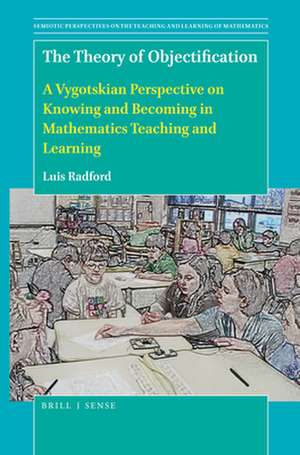The Theory of Objectification: A Vygotskian Perspective on Knowing and Becoming in Mathematics Teaching and Learning: Semiotic Perspectives on the Teaching and Learning of Mathematics, cartea 4
Autor Luis Radforden Limba Engleză Paperback – 7 apr 2021
Drawing on the work of Vygotsky and Freire, the theory of objectification offers a perspective to transform classrooms into sites of communal life where students make the experience of an ethics of solidarity, responsibility, plurality, and inclusivity. It posits the goal of education in general, and mathematics education in particular, as a political, societal, historical, and cultural endeavour aimed at the dialectical creation of reflexive and ethical subjects who critically position themselves in historically and culturally constituted mathematical discourses and practices, and who ponder new possibilities of action and thinking. The book is of special interest to educators in general and mathematics educators in particular, as well as to graduate and undergraduate students.
Preț: 399.18 lei
Nou
Puncte Express: 599
Preț estimativ în valută:
76.40€ • 79.55$ • 64.56£
76.40€ • 79.55$ • 64.56£
Carte indisponibilă temporar
Doresc să fiu notificat când acest titlu va fi disponibil:
Se trimite...
Preluare comenzi: 021 569.72.76
Specificații
ISBN-13: 9789004459649
ISBN-10: 9004459642
Dimensiuni: 155 x 235 mm
Greutate: 0.39 kg
Editura: Brill
Colecția Brill
Seria Semiotic Perspectives on the Teaching and Learning of Mathematics
ISBN-10: 9004459642
Dimensiuni: 155 x 235 mm
Greutate: 0.39 kg
Editura: Brill
Colecția Brill
Seria Semiotic Perspectives on the Teaching and Learning of Mathematics
Cuprins
Preface
Figures and Tables
Introduction: The Ascent from the Abstract to the Concrete
1 Theories in Mathematics Education
1 Outline
2 A Classroom Episode
3 Research Questions
4 Method
5 Theoretical Principles
6 Piaget’s Genetic Epistemology
7 From Method to Methodology
8 Mathematics Education Theories: Two Short Examples
9 The Theory of Objectification
2 An Overview of the Theory of Objectification
1 Outline
2 Introduction
3 Theoretical Underpinnings of the Theory of Objectification
4 Summing up and Looking Ahead
3 Knowledge and Knowing
1 Outline
2 Knowledge
3 Knowing
4 The Piggy Bank Example
5 The Dialectic between Knowledge and Knowing
6 Mathematics as an Entity at the Same Time Ideal, Sensible, and Material
7 Synthesis
4 Learning
1 Outline
2 Learning as Participation in Social Practice
3 Internalisation
4 Processes of Objectification
5 Some Meanings of Objectification
6 Processes of Objectification
7 Learning as Objectification
8 Consciousness
9 Teaching-Learning Activity
10 Processes of Subjectification
11 Synthesis
5 Processes of Objectification
1 Outline
2 The Investigation of Processes of Objectification
3 Teaching-Learning Activity
4 An Example of Investigation of Processes of Objectification
5 Semiotic Means of Objectification
6 Semiotic Nodes
7 Semiotic Contraction
8 Concept
9 Synthesis
6 Embodiment
1 Outline
2 Introduction
3 The Intertwining of the Senses and Culture
4 Perception
5 A Classroom Example
6 The Poetry of Objectification
7 Counting the Unseen
8 Synthesis
7 Task Design: Or Configuring Teaching-Learning Activities
1 Outline
2 General Considerations
3 The Motion of Tina, John, and the Dog
4 Synthesis
8 The Cultural Nature of Mathematical Thinking
1 Outline
2 Introduction
3 Boas’s Relativist Conception of Culture
4 The Anthropological Venerable Conflict
5 A Dialectical Materialist View of Culture
6 Greek Mathematical Thinking Revisited
7 Synthesis
9 Processes of Subjectification
1 Outline
2 The Question of the Subject
3 Semiotic Systems of Cultural Signification
4 Being, Becoming, and Subjectivity
5 Solving Equations in a Grade 3 Classroom
6 Synthesis
10 Ethics
1 Outline
2 The Ineludible Presence of Ethics in the Mathematics Classroom
3 Kant
4 Hobbes
5 Lévinas’s Ethics
6 The Indispensable Task of (Mathematics) Education
7 Towards a Communitarian Ethics
8 Synthesis
References
Index
Figures and Tables
Introduction: The Ascent from the Abstract to the Concrete
1 Theories in Mathematics Education
1 Outline
2 A Classroom Episode
3 Research Questions
4 Method
5 Theoretical Principles
6 Piaget’s Genetic Epistemology
7 From Method to Methodology
8 Mathematics Education Theories: Two Short Examples
9 The Theory of Objectification
2 An Overview of the Theory of Objectification
1 Outline
2 Introduction
3 Theoretical Underpinnings of the Theory of Objectification
4 Summing up and Looking Ahead
3 Knowledge and Knowing
1 Outline
2 Knowledge
3 Knowing
4 The Piggy Bank Example
5 The Dialectic between Knowledge and Knowing
6 Mathematics as an Entity at the Same Time Ideal, Sensible, and Material
7 Synthesis
4 Learning
1 Outline
2 Learning as Participation in Social Practice
3 Internalisation
4 Processes of Objectification
5 Some Meanings of Objectification
6 Processes of Objectification
7 Learning as Objectification
8 Consciousness
9 Teaching-Learning Activity
10 Processes of Subjectification
11 Synthesis
5 Processes of Objectification
1 Outline
2 The Investigation of Processes of Objectification
3 Teaching-Learning Activity
4 An Example of Investigation of Processes of Objectification
5 Semiotic Means of Objectification
6 Semiotic Nodes
7 Semiotic Contraction
8 Concept
9 Synthesis
6 Embodiment
1 Outline
2 Introduction
3 The Intertwining of the Senses and Culture
4 Perception
5 A Classroom Example
6 The Poetry of Objectification
7 Counting the Unseen
8 Synthesis
7 Task Design: Or Configuring Teaching-Learning Activities
1 Outline
2 General Considerations
3 The Motion of Tina, John, and the Dog
4 Synthesis
8 The Cultural Nature of Mathematical Thinking
1 Outline
2 Introduction
3 Boas’s Relativist Conception of Culture
4 The Anthropological Venerable Conflict
5 A Dialectical Materialist View of Culture
6 Greek Mathematical Thinking Revisited
7 Synthesis
9 Processes of Subjectification
1 Outline
2 The Question of the Subject
3 Semiotic Systems of Cultural Signification
4 Being, Becoming, and Subjectivity
5 Solving Equations in a Grade 3 Classroom
6 Synthesis
10 Ethics
1 Outline
2 The Ineludible Presence of Ethics in the Mathematics Classroom
3 Kant
4 Hobbes
5 Lévinas’s Ethics
6 The Indispensable Task of (Mathematics) Education
7 Towards a Communitarian Ethics
8 Synthesis
References
Index
Notă biografică
Luis Radford is a full professor at Laurentian University in Canada. His research focuses on the teaching and learning of mathematics from a cultural-historical perspective, and education as a transformative societal process. He conducts classroom research with primary and high school teachers.
